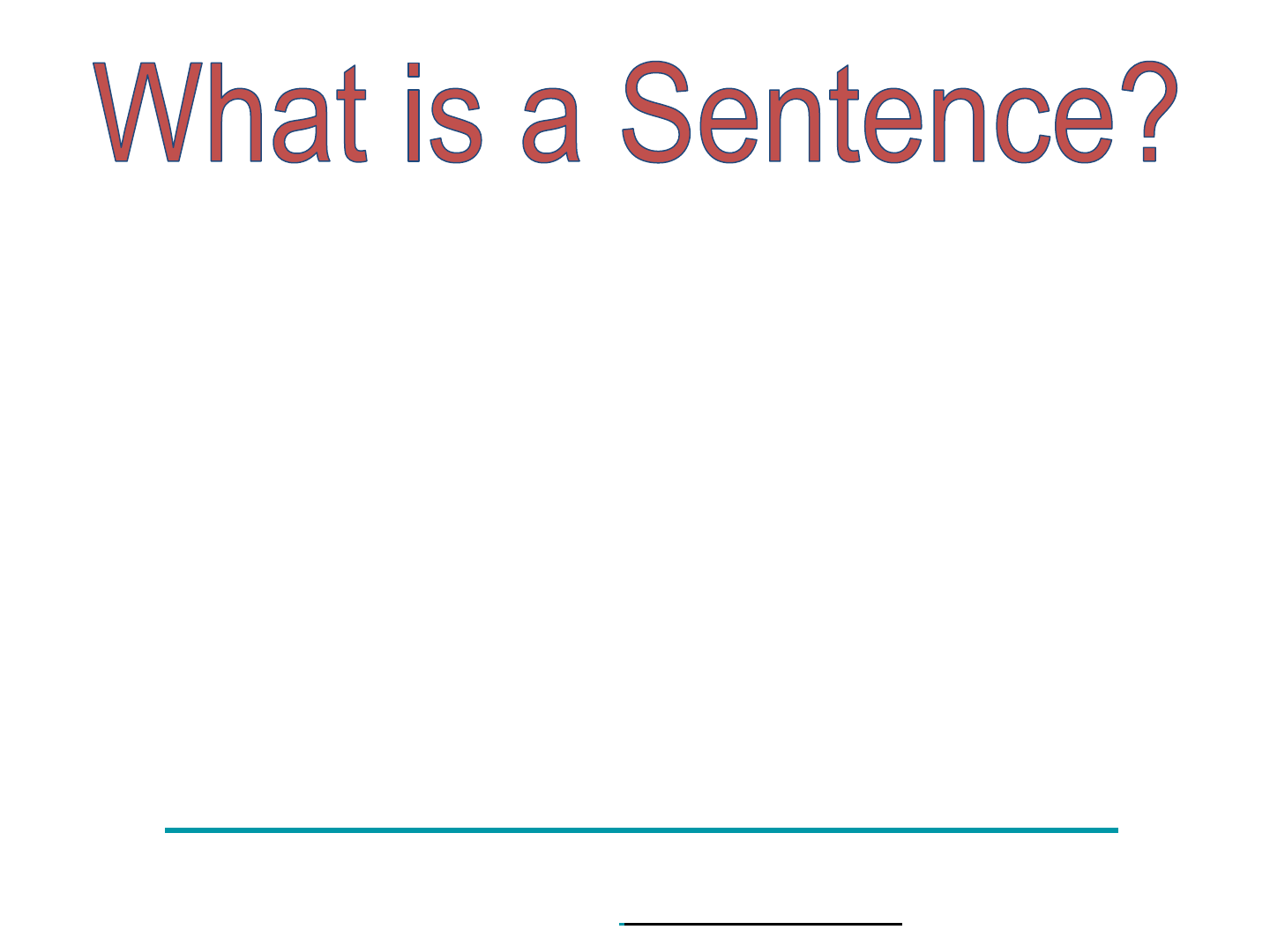
CHAPTER-16 - The Sentence
Little Star Hr. Sec. School
English 2 Class-7
Learning content material created by Miss Trongli and Miss Imlibenla, Teachers, LSHSS
Edited by Madam Christina Neikhrienuo, Principal, LSHSS

A Sentence is a set of words that makes complete
sense.
Every sentence:
▪ begins with a capital letter.
▪ ends with a full stop (.).
a question mark (?)
or an exclamation mark (!)
▪ has a subject and a predicate.
Click here to listen to the sentence song.
More resources available at www.littlestardimapur.com

✔A sentence is made up of two parts- subject and predicate.
✔The subject is the doer of an action expressed through the
verb in a sentence.
✔The part of the sentence which tells us something about the
subject is the predicate.
Click here to watch a video on Subject and Predicate
More resources available at www.littlestardimapur.com

❖ Can be made up of only a verb.
eg: He laughed.
He-subject, laughed-verb
❖ May have an object.
eg: I bought a book.
I-subject, bought-verb, book-object
❖ Can also be made of a complement.
eg: John is a musician.
John-subject, is-verb, musician-complement
*The underlined
words are the
predicates.
*There must be a verb
in the predicate.
More resources available at www.littlestardimapur.com

1. Affirmative sentences are those sentences that make
positive statements.
a. My name is Rita.
b. I love fruits.
2. Negative sentences are those sentences that make
negative statements.
a. My brother doesn’t like Science.
b. Ram does not play basketball.
More resources available at www.littlestardimapur.com

Sentences that are used to give orders or instructions,
make requests or offer advice are called imperative
sentences.
This type of sentence always takes the second person (you)
for the subject but most of the time the subject remains
hidden.
In polite requests, we begin with please followed by the
verb.
Examples:
a. Close the door. (order/instruction)
b. Please pass me that book. (request)
c. Consult a doctor immediately. (advice)
More resources available at www.littlestardimapur.com

Sentences that are used to ask questions are called
interrogative sentences.
In interrogative sentences, the auxiliary verb is placed
before the subject.
There are two types of questions:
1. Yes/no questions.
2. Wh- questions.
Example: Change the given declarative sentence into
interrogative forms.
a. John has bought a cake. (declarative)
→ Has John bought a cake? (interrogative-yes/no type)
→ What has John bought? (interrogative-wh- type)
More resources available at www.littlestardimapur.com

Short questions tagged at the end of statements are called
question tags.
Look at the examples below:
a. You’re good at French, aren’t you?
b. Bindu wasn’t feeling well, was she?
→In the first sentence, the short question, aren’t you? is used to
check whether the statement ‘you’re good at French’ is true or
not.
In this sentence, the statement is affirmative and the question
tag is negative.
→In the second sentence, the short question, was she?, is used
to seek the listener’s agreement.
In this sentence, the statement is negative and the question tag is
affirmative.
More resources available at www.littlestardimapur.com

Short questions tagged at the end of statements are called
question tags.
Look at the examples below:
a. You’re good at French, aren’t you?
b. Bindu wasn’t feeling well, was she?
*In both the sentences, same auxiliary verb is used for
both the statement and the question tag.
The tense of the verb in both the statement and the
question tag is the same.
The subject of the main sentence agrees with the
subject of the question tag.
More resources available at www.littlestardimapur.com

Exclamatory sentences help us communicate feelings of
surprise, admiration, appreciation, wonder and shock.
Always end the exclamatory sentences with an exclamation
mark(!).
Examples: Change the given declarative sentences into
exclamatory sentences.
1. It is a lovely painting.(declarative)
→What a lovely painting it is! (exclamatory)
2. The sky is beautiful. (declarative)
→How beautiful the sky is! (exclamatory)
More resources available at www.littlestardimapur.com

Let’s practice (page-152)
Underline the subject and circle the predicate in the sentences
below.
1. Destruction of trees causes global warming.
2. We must plant and nurture at least one tree every year.
3. Trees provide shelter and food to various animals.
4. We cannot produce food to feed ourselves.
5. Plants help us maintain a proper balance of oxygen supply in
the atmosphere.
6. We need to take care of our environment.
7. Trees are instrumental in preserving the ecological balance.
8. Rainfall is essential for a good harvest.
More resources available at www.littlestardimapur.com

Let’s practice (page-154)
Unjumble the following to form declarative sentences. Remember to
punctuate correctly.
1. Life on Earth is threatened by a new monster.
2. There cannot be a harvest without rain.
3. Rains are a good essential for harvest.
4. Trees play an important role in resisting erosion.
5. They give us so much.
6. We cannot produce food to feed ourselves.
7. A lot needs to be done to save the Earth.
8. Take care of the environment.
9. Plant at least one tree every year and nurture it.
10. I an a trained dancer.
More resources available at www.littlestardimapur.com

Let’s practice (page-155)
Write appropriate answers to these questions using
imperative sentences.
1. Please take a seat.
2. Walk straight and go three blocks from the post office.
3. Grease the baking tray before pouring the batter into it.
4. You may submit the paper and then go out.
More resources available at www.littlestardimapur.com

Let’s practice (page-156)
Change the following sentences into interrogative
sentences.
1. What is Agra famous for?
2. Can you speak Hindi and Telugu?
3. What is your favourite pastime?
4. What is the staple diet of many Indians?
5. Does your father like to watch news on TV?
6. Does she wants to go to the theatre?
7. Who is your favourite actress?
8. What is your favourite subject?
More resources available at www.littlestardimapur.com

Let’s practice (page-158)
1.Change the following declarative sentences into
exclamatory sentences.
a. What a great novel ‘War and Peace’ is!
b. How late are you for the English class!
c. How fast Armaan can write!
d. How well Pradipta can dance!
e. What a beautiful piece of architecture the Qutub Minar
is!
f. How well you can talk!
g. What a great tragedy that was!
h. What a beautiful car my father has!
i. What a kind boy Suhas is!
j. What an interesting movie this is!

Let’s practice (page-158)
2.Identify declarative, interrogative, negative, imperative, and
exclamatory sentences in the following passage.
❖Do you know how to write a persuasive essay?(interrogative
sentence)
❖I’ll tell you briefly what it is.(declarative sentence)
❖A persuasive essay is an essay that convinces your reader about
your ideas on a particular subject.(declarative sentence)
❖A persuasive essay can be based on any topic!(exclamatory
sentence)
❖Select a good topic.(imperative sentence)
❖Think about points both in favour of and against your main
idea.(imperative sentence)

❖How do you put your argument strongly enough to persuade
your audience?(interrogative sentence)
❖Write clear and focused simple sentences to express your
ideas.(imperative sentence)
❖Do not use more than one idea in one sentence.(negative
sentence)
❖Include an example in support of your argument.(imperative)
❖Remember there is an opponent waiting to refute you for what
you wrote!(exclamatory sentence)
❖Keep your counter-arguments ready.(imperative sentence)
❖Incorporate your counter-arguments into your
essay.(imperative sentence)





